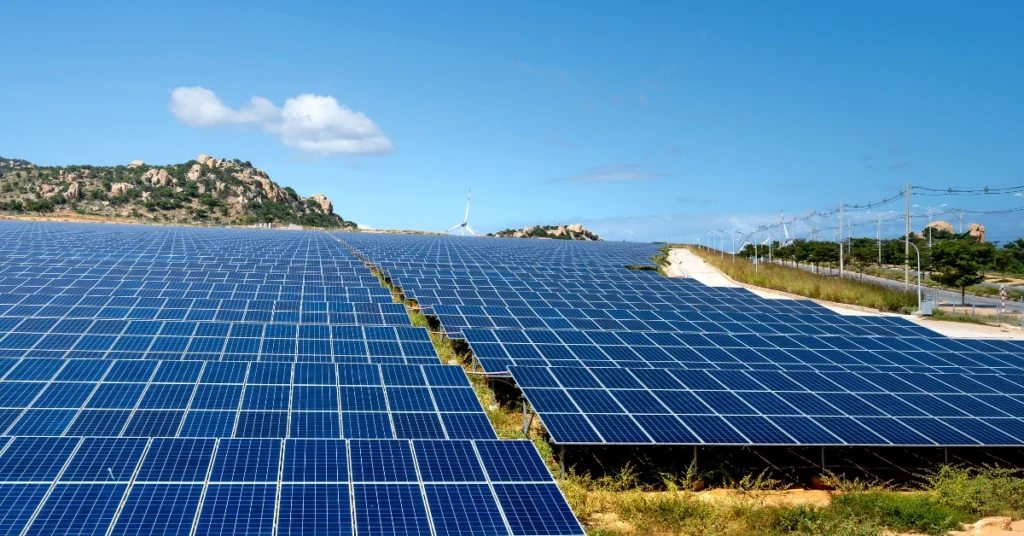14 Solar Power Business Ideas with High Potential

If you’re exploring solar business ideas or broader renewable energy business ideas, the timing couldn’t be better.
The push for green energy combined with a growing eco-conscious consumer base has created an ideal market for solar-based solutions.
The good news is that solar businesses are available to cater to several budgets and scales. Starting from a small residential solar installation or one that goes big, commercial-based projects offer room for everyone in the sector.
Now, let’s see how you can tap into sun power to make a difference and build a business ready for the future.
Profitable Solar Business Ideas in India
While the cost of electricity is on the rise, along with growing concerns about the environment, people are looking for viable sources of energy.
Solar power fulfils both constituencies: clean, renewable, and over time, reduces energy bills exponentially.
Solar Maintenance and Repair Services
The solar maintenance and repair services ensure that installed systems function properly throughout their whole life. This business is all about cleaning panels, replacing broken parts, and solving some technical issues. It requires minimal initial investment and has ever-growing demand; therefore, it is a fantastic entry point for entrepreneurs who are interested in tapping the solar ecosystem. By collaborating with solar installation companies and providing annual maintenance packages, one will be able to generate steady revenue.
Target market: Residential solar customers, commercial buildings with rooftops, and industrial solar farms.
Investment: ₹5 lakh to ₹15 lakh- tools, transportation, and the training of personnel.
Profit Margin: 25-40 per cent; depends upon the service contract and volume of clients.
Manufacturing solar panels
Among solar power business ideas, manufacturing of solar panels would probably be one of the most promising ones. In simple words, think of it as the backbone of the solar industry. The demand for Indian-made solar panels has sky-rocketed. It’s a huge market with possibilities of selling not only to Indian consumers but also abroad.
Target market: Large EPC (Engineering, Procurement, and Construction) companies, exporters, and developers of large-scale solar projects.
Investment: ₹ 50 lakh – ₹ 1 crore, based on the scale of production.
Profit margin: 20-30%, making the business very rewarding for long-term operations.
Solar Inverter and Battery Production
With recurring power outages in rural belts and the booming rooftop solar market in urban landscapes, the sale of high quality inverters and batteries has really gone through the roof. These devices, which store and manage solar energy, are essential tools for residential as well as commercial setups. Improvements in technology also help cut down the expenses of the production process, creating more efficient, affordable products, and entrepreneurs going into this area can target the mass market if they provide credible solutions that meet people’s needs.
Target Market: Homeowners, business owners with rooftop solar installation, and solar EPC (Engineering, Procurement, and Construction) companies.
Investment: ₹40 lakh–₹80 lakh, including costs of manufacturing facilities, machinery, and raw materials.
Profit Margin: 25–35% for higher margins with innovations such as smart inverters and lithium-ion battery solutions.
Rooftop Solar Installation
The business involves providing overall services such as site assessment, system design, installation, and ongoing maintenance. The market will grow since more urban homeowners and businesses seek to minimize energy bills while becoming more sustainable. Entrepreneurs who emphasize high-quality service with customer education can immediately establish a track record in such a competitive marketplace. The Indian scheme PM-KUSUM aligns well with this business model, making it a profitable venture with effective impacts.
Target Market: Urban households, SMEs, schools, hospitals, and government offices.
Investment: ₹20 lakh–₹50 lakh, for equipment, skilled technicians, and marketing.
Profit Margin: 15-25 per cent based upon project complexity and Customer Acquisition methodology
Solar Water Pump Manufacturing
These systems enable farmers to irrigate their fields with clean and sustainable energy, significantly reducing operational costs. This business is profitable while at the same time contributing to the nation’s sustainable development goals through the empowerment of farmers with green solutions. Joint ventures with agricultural bodies and microfinance institutions will boost sales further. Durable and efficient pumps customized for local conditions will ensure consistent customer loyalty.
Target Market: Farmers, agricultural cooperatives, NGOs, and government-backed irrigation projects.
Investment: ₹50 lakh–₹1 crore, covering machinery, R&D, and compliance with industry standards.
Profit Margin: 20–30%, depending on production scale and market reach.
Solar-Powered Devices
These appliances provide energy-saving alternatives to homes and small businesses, that are trying to reduce electricity bills. Providing the customer with dependable, long-lasting, and affordable appliances will increase market share in this segment. Increasing product lines and building partnerships with NGOs and solar distributors will help push sales higher.
Target Market: Rural households, Urban eco-conscious consumers, and Small business people.
Investment: ₹30 lakh–₹70 lakh, mainly in the manufacturing, R&D, and marketing activities.
Profit Margin: 20-35% in the case of high-value premium and innovative products.
Solar Energy Consulting
With the growth in solar energy adoption, many customers and businesses look forward to adopting solar energy but find it challenging how to get the right systems. A business that specializes in solar energy consultancy bridges this gap by offering services in the provision of system designs, energy auditing, and installations. This business requires a little investment, with the target mainly being professionals working in renewable energies or engineering departments. Focusing on recommendations would help consultants have a good name in this service.
Target Market: Homeowners, SMEs, Government institutions and industries looking forward to installing or using solar energy.
Investment: ₹10 lakh–₹25 lakh, covering certifications, software tools, and marketing.
Profit Margin: 30–40%, with the scope for growth through premium consulting packages.
Solar Farm Development
Solar farms are mega projects that generate electricity for sale to utilities or businesses. This kind of business involves purchasing land, mounting solar panels, and connecting the system to the grid. With government incentives and long-term PPAs, solar farms promise steady and substantial income. Opportunities in hybrid solar-wind projects can be pursued by entrepreneurs for diversifying revenues.
Target Market: Power distribution companies DISCOMs, industries, and government projects.
Investment: ₹1 crore–₹5 crore, including land acquisition, panel installation, and grid integration.
Profit Margin: 25–35% from consistent revenue in PPAs and government schemes.
Solar-Powered EV Charging Stations
Charging stations placed strategically in urban areas or highways and collaborating with EV manufacturers maximize visibility and profits. This concept puts entrepreneurs right at the heart of two growing industries: solar energy and electric mobility. These stations generate electricity from the sun to power the electric vehicles, thereby not being dependent on traditional electricity grids.
Target Market: Urban EV owners, fleet operators, and highway commuters.
Investment: ₹20 lakh-₹50 lakh, majorly for the land, solar panels, and charging infrastructure.
Profit margin: 20-30 % for high-return yields in very trafficked places.
Solar Panel Recycling
This business recovers valuable materials like silicon, glass, and metals from solar panels, ensuring sustainable waste management and resource recovery. As environmental regulations are becoming more stringent, this business promises to have strong growth potential. It can secure a steady raw material supply by partnering with solar companies and government agencies and increasing profits.
Target Market: Solar farms, residential users, and solar manufacturers.
Investment: ₹50 lakh–₹1 crore, for machinery, plant setup, and waste handling certifications.
Profit Margin: 25–35% with possibilities in scaling business lines by offering collection and transportation services.
Solar Software Solutions
This is a great idea for tech-enabled entrepreneurs who have an interest in renewable energy. These solutions would help manage the solar installations, monitor the production of energy, and optimize the system performance. Such apps or platforms can be created catering to the owners of solar panels, installers, or even grid operators and offer real-time tracking and fault detection. Partnerships with solar installation companies and customised solutions could further increase the market penetration.
Target Market: Solar EPC contractors, system integrators, and residential solar users.
Investment: ₹10 lakh–₹30 lakh mainly in software development and marketing.
Profit Margin: 30–40% depending upon the subscription model or one-time licensing fees.
Solar Cold Storage Solutions
Setting up units in agricultural belts and partnering with cooperatives could scale up reach and impact. This business supports the solar industry besides protecting food security and effectively encouraging rural development. The units provide temperature-controlled storage for perishable goods even in remote areas with unreliable electricity. Subsidies from the government and growing awareness make this business highly promising.
Target Market: Farmers, agribusinesses, and food processing companies.
Investment: ₹20 lakh-₹70 lakh which encompasses solar panels, cooling system and storage infrastructure.
Profit Margin: 25–40%, with long-term contracts improving revenue stability.
Solar-Powered Microgrids
A solar-powered microgrid is a small-scale, self-contained energy system that provides electricity to rural and off-grid areas. The microgrid does not rely on the traditional grid but uses renewable energy. Microgrids answer both the issue of energy access and environmental concerns, which is socially impactful for a business.
Target Market: It targets rural communities, NGOs, and government agencies.
Investment: ₹30 lakh–₹1 crore for photovoltaic arrays, inverters, and distribution system.
Profit margin: 20–35%, with potential subsidies improving the viability.
Solar Training Institutes
With the fast expansion of the solar industry, there is an urgent requirement for qualified personnel. The institutes train students with the necessary technical know-how for installation, maintenance, and design of systems. This venture caters not only to the growth of the industry but also helps fill the gap in renewable energy skills. With courses certified by the government and practical on-field training, this can boost the reputation and help more students join the venture.
Target Market: Aspiring solar technicians, electricians, and engineering students.
Investment: ₹10 lakh–₹30 lakh, for premises, training equipment, and marketing.
Profit Margin: 30–45%, with opportunity to scale up into corporate training.
Start small or dream big, but what is immense in this case is the potential for growth while doing good for the greener future.
Business ideas that are gaining popularity abroad and not so much in India will give you that unique edge, such as a solar-powered charging station or even a solar-integrated smart home.
After all, what is going up is the requirement for sustainable solutions, and therefore, now will be the opportune time.
So go out there, do your research, and make your mark in this transformational industry!
Disclaimer: The information contained in this blog, The Growth File, is intended for general informational purposes only and does not constitute professional advice. Always consult with a qualified professional before making any business decisions based on the information you find on this blog.
What’s New?
-
18 Distribution Business Ideas in India for New Founders
Business Ideas -
Benefits of Research in Business Every Founder Needs
Growth -
Importance of Marketing for Local Businesses in India
Marketing -
13 Bicycle Business Ideas for Small and Mid-Scale Units
Business Ideas -
13 Plastic Business Ideas to Start from Your Small Plant
Business Ideas
